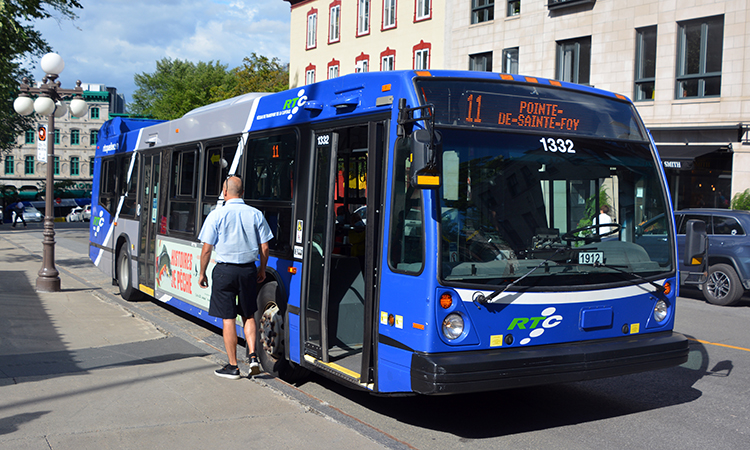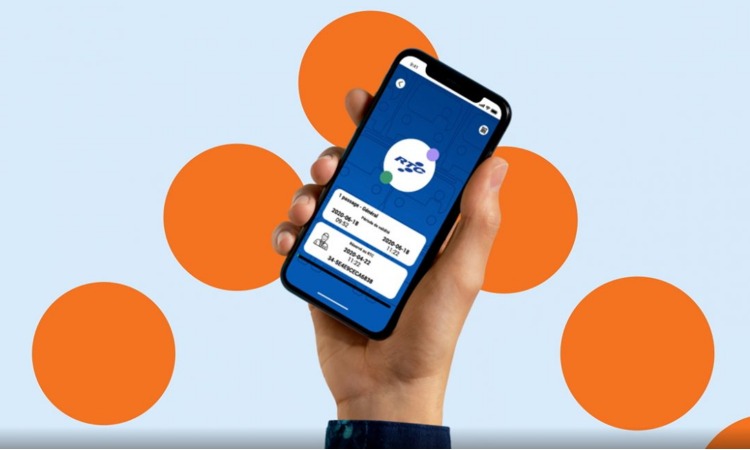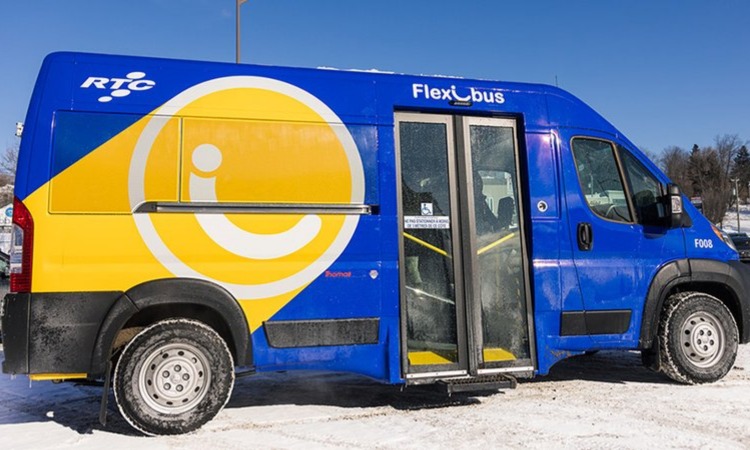Getting passengers back on-board: RTC Quebec’s road to recovery
- Like
- Digg
- Del
- Tumblr
- VKontakte
- Buffer
- Love This
- Odnoklassniki
- Meneame
- Blogger
- Amazon
- Yahoo Mail
- Gmail
- AOL
- Newsvine
- HackerNews
- Evernote
- MySpace
- Mail.ru
- Viadeo
- Line
- Comments
- Yummly
- SMS
- Viber
- Telegram
- Subscribe
- Skype
- Facebook Messenger
- Kakao
- LiveJournal
- Yammer
- Edgar
- Fintel
- Mix
- Instapaper
- Copy Link
Posted: 10 October 2022 | Valérie Racine - RTC Quebec | No comments yet
For the latest instalment of Intelligent Transport’s exclusive COVID-19 recovery series, Valérie Racine, Director of Network Development, Customer Experience and Communications at RTC Quebec, shares the difficulties that the authority had faced amidst the COVID-19 pandemic and how deploying innovative solutions – such as mobile ticketing, new fare passes, shared micro-mobility and on-demand services – helped to increase the city’s public transit ridership.


The pandemic hit the world hard. Almost overnight, the whole of society had to stop and then step-up efforts to innovate and build resilience, reprioritise and make high-impact decisions in record time.
At its lowest point in March 2020, Réseau de transport de la Capitale served only 20 per cent of the regular ridership of a comparable period in 2019″
Public transit authorities were no exception. Identified as priority services by the Quebec government, they continued to faithfully provide service to those customers who continued to travel. Of course, lockdown measures, the shift to working from home and the fear of the virus severely affected public transit ridership. At its lowest point in March 2020, for example, Réseau de transport de la Capitale (RTC Quebec) served only 20 per cent of the regular ridership of a comparable period in 2019.
Despite the end of lockdown, transit ridership is nowhere near where it was before the pandemic. In order to remedy the situation, RTC has focused on several innovative solutions, including:
- Launching a mobile app that allows users to purchase and activate transit fares anywhere, anytime
- Creating a pass better suited to the reality of those working from home
- Implementing on-demand transit service in areas less well served by regular bus routes
- Launching an e-bike-sharing service.
Seeing the opportunities in every crisis: Launch of mobile payment
The pandemic created an opportunity for RTC to create the RTC Nomade Payment mobile app.
On 28 May 2020, RTC unveiled RTC Nomade Payment, a new free mobile app that allows riders to purchase and activate transit fares on their mobile phones. The app has been available to RTC and Service de transport adapté de la Capitale (STAC) customers since 18 June 2020. Fares for the transit authority in the neighbouring city of Lévis are also available on the app.
The main objective of the new payment solution was to meet customer demand to purchase transit fares anywhere, anytime”
RTC Nomade Payment came in addition to existing payment methods, including OPUS and cash. The main objective of the new payment solution was to meet customer demand to purchase transit fares anywhere, anytime. In addition to offering greater flexibility, the ability to purchase transit fares on smartphones and activate them without contact helps to provide sanitary operating conditions for customers, partners and employees.
To build awareness of the app among transit riders, RTC launched a multi-platform ad and information campaign with the theme ‘Buy transit fares anywhere, anytime’. This included a TV spot, a radio spot, traditional and digital signage, optimised social media and use of the RTC real-time Nomade digital tools available to the authority.
To date, nearly 134,000 accounts have been created and over three million transit fares purchased on the RTC Nomade Payment app. These figures show that the app meets a real customer need to purchase transit fares securely at any time. For reference, RTC counted 33 million annual trips across its network and 55,000 unique customers each month before the pandemic.
RTC is the first transit authority in Quebec to implement this payment method, but the solution developed is proven and used by nearly 40 other transit authorities, mainly in Europe.


Credit: Réseau de transport de la Capitale (RTC)
Meeting the needs of those working from home
During the pandemic, sales of monthly passes quickly fell in favour of occasional transit fares, including single tickets. This decrease was largely due to the vast number of people now working from home and rarely travelling for work. Since a monthly pass no longer met their needs, RTC decided to introduce a new pass better suited to their reality.
Customers expressed their level of interest in a variety of options, and the 20-ticket bundle with no expiration date was the most popular among participants working from home”
But the decision needed to be backed by detailed data on customer intentions and the likelihood that people would continue working from home after the pandemic. In February 2021, nearly 1,500 customers – both full- and part-time workers – completed an online survey. Some also participated in focus groups via video conference. These customers expressed their level of interest in a variety of options, and the 20-ticket bundle with no expiration date was the most popular among participants working from home for three or more days a week.
Since launching on 1 July 2021, the new ticket bundle has grown in popularity, with customers purchasing it more than 72,000 times.
Focusing on integrated mobility
In its 2018–2027 Strategic Plan, RTC committed to making Quebec City a model of innovation in urban transportation among comparable North American cities. In order to reach that goal, the authority is counting on a diversified and integrated range of services to meet the needs of residents and help to improve the quality of life in the capital, which has a population of nearly 600,000.
Integrated mobility will empower riders by allowing them to choose the mode of transportation best suited to their needs”
Ultimately, integrated mobility will empower riders by allowing them to choose the mode of transportation best suited to their needs from among a range of efficient options that make sense for the area, current conditions and trips that they want to make. This is an emerging model that considers customer preferences and is facilitated using technology.
In the past year, RTC has taken two giant steps that bring Quebec City that much closer to integrated mobility:
- The launch of àVélo, an e-bike-sharing service
- The launch of Flexibus, an on-demand transit service.
àVélo: An e-bike-sharing service
RTC’s e-bike-sharing service was launched on 9 July 2021, to the delight of city residents. For the first year, there were a total of 10 stations and 100 e-bikes in downtown Quebec City. In terms of fares, there were two options: one-way trips and a 30-day pass. The first season ended on 31 October 2021 and generated a total of 29,000 trips.
By 2024, Quebec city will be equipped with 100 stations and 1,000 e-bikes”
In 2022, for the second season of àVélo, 40 stations and 400 bicycles were rolled out. In response to customer requests and feedback, the fare schedule was modified to include additional 30-day pass options, as well as an annual pass.
During the month of July in the second season of àVélo, an average of 1,437 trips were made each day with the e-bikes. The concept of bike-sharing makes sense when considering that each bike was used slightly more than five times in one day, on average, during the busiest day of the season. The new fare schedule succeeded in building customer loyalty, with 80 per cent of trips being made by riders with annual or 30-day passes.
By 2024, Quebec city will be equipped with 100 stations and 1,000 e-bikes.


Credit: Réseau de transport de la Capitale (RTC)
Flexibus on-demand transit service
Launched on 7 March 2022, RTC’s on-demand transit service quickly piqued the curiosity of residents. The goal of Flexibus is to improve the availability of public transit in areas on the outskirts of the city, where regular bus service offers less flexibility for local trips. For the first launch phase, the service was offered in three areas, with plans to gradually roll it out in other areas of the city over the next few years.
Flexibus provides transportation within the same area for short trips (to see a friend, go to the pharmacy, etc.) or to connect to regular bus routes. Customers can request Flexibus transportation by phone, on the website, or via a mobile app. On average, transit requests are answered within 20 minutes. All RTC fares are accepted on Flexibus, so customers don’t need to buy special tickets to use on-demand transit.


Credit: Réseau de transport de la Capitale (RTC)
After less than five months of service, Flexibus has completed over 40,000 trips, with over 8,000 accounts having been created on the app”
Nine Flexibus vehicles currently serve the three existing areas, but more will be added each year to serve new areas. The vehicles can accommodate up to seven passengers and are wheelchair accessible.
As of 4 August 2022, after less than five months of service, Flexibus has completed over 40,000 trips, with over 8,000 accounts having been created on the app. To assess customer satisfaction, riders complete a short survey in the app after each trip. Since the service has been launched, the average score has been 4.8/5.
Serving the customer
In conclusion, although RTC has not yet managed to regain its pre-pandemic ridership level, the roll-out of innovative solutions – such as RTC Nomade Payment, the 20-ticket bundle, àVélo and Flexibus – has made it possible to better meet customer needs and diversify the service offering.
Every crisis brings opportunities that must be seized for the benefit of customers, and RTC has done exactly that.


Related topics
Accessibility, COVID-19, Fleet Management & Maintenance, Getting Passengers Back On-Board: Transport's Road to Recovery Series, Micro-mobility, Mobility Services, Multimodality, On-Demand Transport, Passenger Accessibility, Passenger Experience, Public Transport, Ticketing & Payments
Related modes
Bikes & Scooters, Bus & Coach
Related cities
Quebec
Related countries
Canada
Related organisations
Le Réseau de transport de la Capitale (RTC Quebec), Service de transport adapté de la Capitale (STAC)
Related people
Valérie Racine








